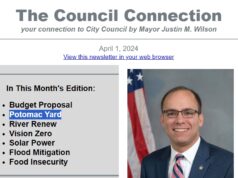Arlington is gearing up for a special election to replace Senator-elect Barbara Favola on the County Board, with the caucus dates now set for 2/2 and 2/4 (at the NRECA Building and Kenmore Middle School, respectively), and with numerous candidates announcing at this past Wednesday’s ACDC meeting (see videos of their speeches here). I recently sent out questionnaires to all the announced Democratic candidates, with a deadline of this morning. The first interview, with Elmer Lowe, is available here. The second interview, with Melissa Bondi, is available here. The rest will follow shortly. Thanks to Mr. Lowe, Ms. Bondi, and Mr. Sims for returning their Blue Virginia surveys (on time is an added bonus!), and to the other candidates in advance for their responses as well.
1. Why are you running for Arlington County Board and what makes you the most qualified candidate at this time?
I am running for a seat on the Arlington County Board because I want to serve our county in a greater capacity, and I feel that my public and private sector experience will allow me to make an immediate and positive impact. I will bring a unique perspective in several respects.
I am a West Point graduate with a Bachelors degree in systems engineering. I currently work for a private sector research company leading a team in developing an analytical database for the Department of Defense. As an Arlington home owner and taxpayer, I understand the challenges many of us face in making that mortgage payment each month. As past Chair of the Arlington Fiscal Affairs Advisory Committee, I learned that as well managed as our county government is, there are ways we can make more effective use of our tax dollars.
Having served in Iraq as the officer responsible for government and civil operations in a Baghdad district of over one million people, I have a deep respect and appreciation for the power that local government has in making a positive impact on people’s lives. My experience in leading our efforts in Baghdad, building neighborhoods from nothing, taught me the fundamentals of local government, from providing clean water and ensuring functioning sewage systems to building roads and creating schools.
For years, I have mentored and tutored Arlington youth in schools and community centers throughout the county. Many of these exuberant and intelligent children live in affordable housing; they are an important part of Arlington’s future. Tutoring these children has taught me, in very stark terms, that we owe it to our youth to ensure sufficient resources are available so they are well prepared to lead successful lives.
As a member of the 8th Congressional District Steering Committee, Chair of the Virginia Democratic Party’s Veterans and Military Family Caucus, President of the Northern Virginia Black Democrats, and the 2008 Co-Director of Virginia Veterans for Obama, I’ve gained invaluable experience from being on the frontlines of our political process.
I approach problem solving with an emphasis on a careful, objective and strategic analysis of the facts. I ask not only what do we hope to achieve, but why do we hope to achieve it, how do we hope to achieve it, and what are the attendant costs, both human and monetary.
2. What would you say are the top three challenges facing Arlington County right now?
Three of the top challenges facing Arlington County are: (1) ensuring proper funding for our schools in light of the anticipated growth in the student population over the next five years; (2) making progress on affordable housing; (3) continuing the tradition of smart-growth in the county, balancing the needs of our citizens with the needs intrinsic in remaining a center of economic prosperity.
3. What rules do you believe should apply to Arlington County Board members with regard to campaign contributions from donors with past, present, or upcoming business before the board?
County Board members should disclose and abstain from any matter before the County Board involving a person or entity from which they have received a significant campaign contribution.
4. In general, do you believe that Arlington County Board members should conform to the Arlington County Code of Ethics, including items such as “Adhere to conflict-of-interest rules and avoid activities with real or perceived conflicts of interest?” Do you believe the Arlington County Code of Ethics should be revised? If so, what specific changes should be made to them?
This question is answered within the context of the Code of Ethics posted on the Arlington County website in a memo signed by Ron Carlee.
The aspirational principles set forth in the memorandum provide strong guidance for the behavior of public employees, including our County Board members. I support these principles and do not think they currently require revision, although they should be regularly reviewed and subsequently updated as needed.
5. How, in your view, should Arlington County best work within the constraints of the Dillon Rule and a state government dominated by Republicans in order to achieve the most environmentally friendly and most progressive community (e.g., in the areas of human rights and immigration) possible?
The Dillon Rule complicates Arlington’s ability to adequately address its own issues and concerns. Nevertheless, I think it is unlikely the Dillon Rule will be overturned, at least not in its entirety and particularly not by a Republican-dominated legislature. Fortunately, Arlington County has one of the most highly educated populaces in the nation. We are a community fully capable of determining and utilizing creative, progressive, and often game-changing solutions to our problems.
In the short run, Arlington County should seek to advance legislation to address specific concerns. In the long run, the Democratic Party and the Arlington County Board should work to send legislators to Richmond who understand the limitations of the Dillon Rule and seek to limit its effect.
6. Do you support requiring, or at the minimum strongly incentivizing, all new commercial buildings constructed in Arlington County being constructed to the highest possible energy efficiency and “green” standards (e.g., LEED Gold or Platinum) possible? If you favor incentives, what specific incentives do you favor? If not, why not?
This is an area in which Arlington can become a world leader. As a result, I support construction of buildings in Arlington which meet the highest possible efficiency and green standards. Whether or not Arlington County should subsidize these buildings through tax or other incentives is an economic question which needs careful review. The County Board must understand that decisions involving tax subsidies for buildings will reduce the tax base that is available to pay for schools, affordable housing, and other environmental programs; therefore, decisions should be made only after careful review and in-depth cost/benefit analysis.
7. At the present time, do you see Arlington County as not friendly enough to small business, just about right, or overly permissive?
Arlington needs to be a place where small businesses can thrive. One of the many terrific aspects of our county is how Arlington is filled with such an array of small businesses. We all benefit from having many wonderful restaurants and retail shops, but we also benefit from having some of the nation’s most innovative small companies located right here in Arlington. We should constantly review our policies and regulations in order to ensure that Arlington is small business friendly.
8. Would you support putting strong incentives in place to encourage homeowners, businesses, and county facilities to install permeable pavement and other measures to prevent runoff of water?
I strongly support promoting environmental measures which are designed to prevent the run off of water, when economically feasible. Funding this, and other similar projects, is one of the reasons it is so critical that Arlington County is run as efficiently as possible.
9. When the county orders the height of new residential buildings near Metro reduced in the name of aesthetics, what benefits do Arlingtonians see, and does that benefit offset the resulting reduced availability of housing?
The benefits of aesthetics to Arlingtonians are real. They create more desirable neighborhoods which increases demand for housing in those neighborhoods, ultimately increasing tax revenues. Arlington’s General Land Use Plan was created with the idea of tapering buildings into the surrounding residential neighborhoods. It was a good formula, striking a balance between commercial and residential needs. The task for the County Board is to develop policies which are consistently applied across neighborhoods in Arlington. Residents and investors should be able to understand and anticipate the decisions and the decision making process. These policies, of course, would include consideration of the effect of height restrictions on available housing.
10. What is your definition of “The Arlington Way,” do you believe our county’s been living up to it, and what can be done to strengthen it?
“The Arlington Way” is an expression which captures Arlington’s desire to include all constituencies in decisions which will affect them. It encompasses transparency and community dialogue, and a process giving the time to encompass both. I think that the County has generally strived to make decisions according to “The Arlington Way”. I would certainly embrace the benefits of both transparency and community dialogue as a member of the County Board.
11. Do you believe Arlington has the best possible process for determining which new capital projects to undertake and which to defer? If you believe this process could be improved, which specific improvements do you recommend and why?
The Capital Improvement Program as outlined by the Department of Management and Finance provides a strong framework for new capital projects. As with any set of guidelines, Arlington County should update and improve the framework, as required. Certainly, choosing which capital improvement projects we undertake is a significant decision requiring careful consideration of the associated costs and benefits, as well as how those costs and benefits align with our recognized priorities.
12. What is your vision for the optimal Arlington County in the short term (5 years or less), medium term (10-15 years) and long term (20 years and out)? How would you go about achieving that vision?
Let me state that I believe Arlington County is one of the best places to live in the country. We do an awful lot right. Yet, I do believe we can make it an even better place to live, work and raise a family. As mentioned previously, the next five years will be a critical juncture for our schools as we must rise to the challenge of creating an estimated 3,500 additional seats for students. We must seek creative solutions, maximizing existing spaces and more stringently analyzing current construction plans for schools and other county buildings. It is important to recognize that our current growth trends, while presenting many real and often complicated challenges, could also afford us many strengths which can help maintain a positive outlook for the County in five, ten, fifteen or even fifty years, if they are properly planned for and managed.


 Sign up for the Blue Virginia weekly newsletter
Sign up for the Blue Virginia weekly newsletter









